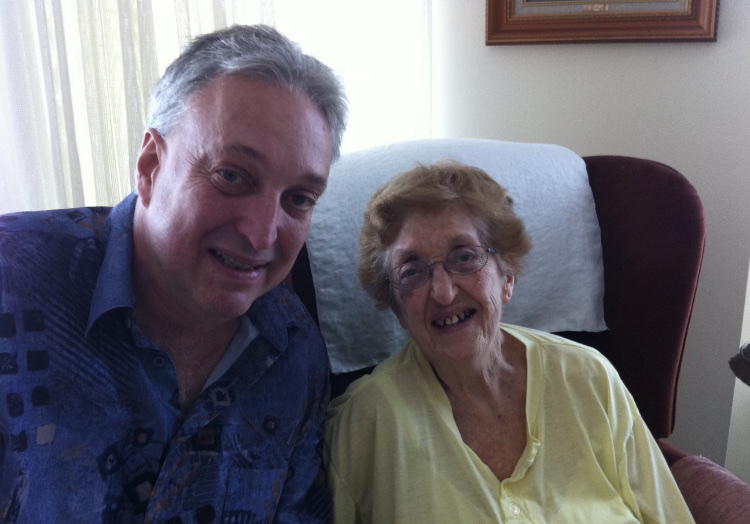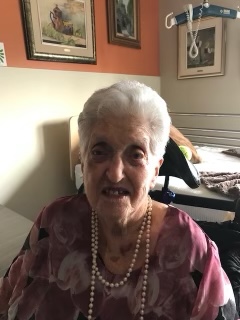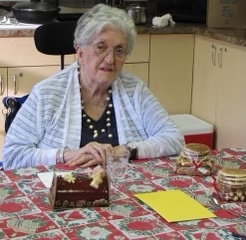‘Negligent’: Class-action lawsuit request against Quebec government for COVID-19 response
Posted September 19, 2023 4:10 pm.
Last Updated September 20, 2023 6:10 pm.
Jean-Pierre Daubois is the main plaintiff in a request for a class-action lawsuit against Quebec government health authorities, on behalf of all residents of public long-term care homes that experienced COVID-19 outbreaks during the pandemic’s first two waves.
His goal, he says, is to be able to “force the government to take responsibility for what they did.”

Anna-José Maquet died during the first wave of COVID-19 in a CHSLD. (Courtesy: Jean-Pierre Daubois)
His 93-year-old mother, Anna-José Maquet, was one of those people. She died on April 3, 2020, while at CHSLD Ste-Dorothée in Laval, north of Montreal, where 101 residents died during the first wave.

Anna-José Maquet died during the first wave of COVID-19 in a CHSLD. (Courtesy: Jean-Pierre Daubois)
“My mother choked on water at 6:30 a.m. that morning and by around 9:30 or 10 a.m. they put her on a respiratory protocol,” he said. “But what we found out, it was not really a respiratory protocol, it was a protocol to end life without pain.”
Daubois said there wasn’t a doctor on duty at the residence.
“There was one nurse who was, I think, covering two or three positions of nurses, and a student nurse was not allowed to make decisions,” he said.

Anna-José Maquet died during the first wave of COVID-19 in a CHSLD. (Courtesy: Jean-Pierre Daubois)
The class action request alleges that the conduct of health establishments and authorities was “faulty and negligent” and is “the direct and probable cause of the outbreaks”. At least 5,347 deaths occurred in CHSLDs within a year of the pandemic.
READ: Class-action lawsuit application for COVID-19 response in CHSLDs begins in Quebec
“It’s one thing to say not to send the elderly to the hospital, but what they never said is that none of the CHSLD had the equipment to treat infected people,” Daubois said. “They were leaving the elderly to their fate, not providing them the necessary care.”
The lawyer leading the suit, Patrick Martin-Ménard, says the health authorities had delayed implementing the Quebec plan to fight a pandemic, which was adopted in 2006.
“If this plan had been launched, as it should have been in January when the menace appeared, when the threat of COVID 19 appeared in China, and then crossed Chinese borders, we would have had a window of opportunity through which we could have prepared the health care system much better than what we did,” Martin-Ménard said.
The lawsuit would also include family members of residents who died between March 2020 and March 2021.
“It’s one of the biggest tragedies that this the province of Quebec has seen in terms of death toll and in terms of the significant human impact that it had on so many people,” Martin-Ménard said. “So we’re potentially talking about a very large class action with thousands of class members who each will have a claim regarding both the personal prejudice suffered by the residents.”
The judge can take up to six months to decide on whether they’ll authorize the class-action.
If approved, the class action would seek $100,000 per deceased victim, $100,000 for their spouse, and $30,000 for their children.
$40,000 would also be claimed for each resident living in a CHSLD during that time period covered.
There are around 20 defendants in this case, including the Quebec Health Ministry, the CIUSSS and CISSS – the regional health boards – and Quebec’s previous and current public health director.
The health authorities tell CityNews they can’t comment on the case, as it’s before the courts. They will present their counterarguments on Thursday and Friday.
“We are hoping, through this class-action, to have this accountability for everything that has happened,” said Martin-Ménard.
“It’s absolutely necessary if we are to take any lessons from this and make the necessary changes in the healthcare system that need to be and have the measures put in place and ready to be activated in time of a possible pandemic,” said Daubois.



